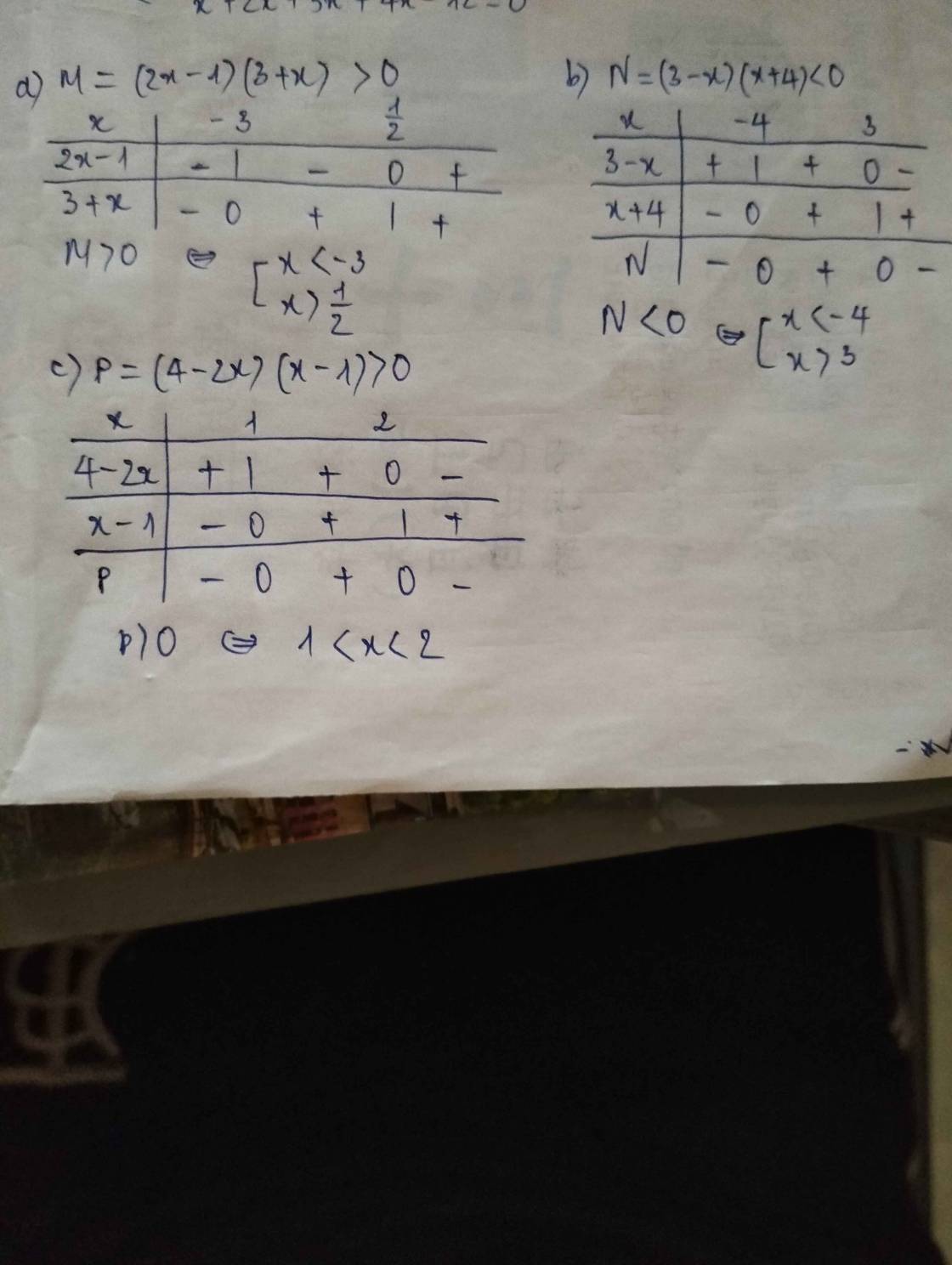\(\left|2x-1\right|-\left|x+3\right|=4\)

Những câu hỏi liên quan
1) \(\left(3-x^2\right)+6-2x=0\)
2) \(5\left(2x-1\right)+7=4\left(2-x\right)+2\)
3) \(x^2-6x+4\left(x-6\right)=0\)
4) \(\left(x+1\right)\left(2x-3\right)=x\left(x+1\right)\)
1) Ta có: \(\left(3-x^2\right)+6-2x=0\)
\(\Leftrightarrow3-x^2+6-2x=0\)
\(\Leftrightarrow-x^2-2x+9=0\)
\(\Leftrightarrow x^2+2x-9=0\)
\(\Leftrightarrow x^2+2x+1=10\)
\(\Leftrightarrow\left(x+1\right)^2=10\)
\(\Leftrightarrow\left[{}\begin{matrix}x+1=\sqrt{10}\\x+1=-\sqrt{10}\end{matrix}\right.\Leftrightarrow\left[{}\begin{matrix}x=\sqrt{10}-1\\x=-\sqrt{10}-1\end{matrix}\right.\)
Vậy: \(S=\left\{\sqrt{10}-1;-\sqrt{10}-1\right\}\)
Đúng 2
Bình luận (0)
2) Ta có: \(5\left(2x-1\right)+7=4\left(2-x\right)+2\)
\(\Leftrightarrow10x-5+7=8-4x+2\)
\(\Leftrightarrow10x+4x=8+2+5-7\)
\(\Leftrightarrow14x=8\)
\(\Leftrightarrow x=\dfrac{4}{7}\)
Vậy: \(S=\left\{\dfrac{4}{7}\right\}\)
Đúng 2
Bình luận (0)
3) Ta có: \(x^2-6x+4\left(x-6\right)=0\)
\(\Leftrightarrow x\left(x-6\right)+4\left(x-6\right)=0\)
\(\Leftrightarrow\left(x-6\right)\left(x+4\right)=0\)
\(\Leftrightarrow\left[{}\begin{matrix}x-6=0\\x+4=0\end{matrix}\right.\Leftrightarrow\left[{}\begin{matrix}x=6\\x=-4\end{matrix}\right.\)
Vậy: S={6;-4}
Đúng 2
Bình luận (0)
Xem thêm câu trả lời
Giải các phương trình sau:
f. 5 – (x – 6) = 4(3 – 2x)
g. 7 – (2x + 4) = – (x + 4)
h. \(2x\left(x+2\right)^2-8x^2=2\left(x-2\right)\left(x^2+2x+4\right)\)
i. \(\left(x-2^3\right)+\left(3x-1\right)\left(3x+1\right)=\left(x+1\right)^3\)
k. (x + 1)(2x – 3) = (2x – 1)(x + 5)
f. 5 – (x – 6) = 4(3 – 2x)
<=>5-x+6=12-8x
<=>7x=1
<=>x=\(\dfrac{1}{7}\)
g. 7 – (2x + 4) = – (x + 4)
<=>7-2x-4=-x-4
<=>x=7
h. 2x(x+2)\(^2\)−8x\(^2\)=2(x−2)(x\(^2\)+2x+4)
<=>\(2x\left(x^2+4x+4\right)-8x^2=2\left(x^3-8\right)\)
<=>\(2x^3+8x^2+8x-8x^2=2\left(x^3-8\right)\)
<=>\(2x^3+8x=2x^3-16\)
<=>\(8x=-16\)
<=>\(x=-2\)
i. (x−2\(^3\))+(3x−1)(3x+1)=(x+1)\(^3\)
<=>\(x-8+9x^2-1=x^3+3x^2+3x+1\)
<=>\(6x^2-2x-10=0\)
<=>\(3x^2-x-5=0\)
<=>\(\left[{}\begin{matrix}x=\dfrac{1+\sqrt{61}}{6}\\x=\dfrac{1-\sqrt{61}}{6}\end{matrix}\right.\)
k. (x + 1)(2x – 3) = (2x – 1)(x + 5)
<=>\(2x^2-x-3=2x^2+9x-5\)
<=>10x=2
<=>\(x=\dfrac{1}{5}\)
Đúng 1
Bình luận (0)
f. 5 – (x – 6) = 4(3 – 2x)
<=>5-x+6=12-8x
<=>7x=1
<=>x=\(\dfrac{1}{7}\)
g. 7 – (2x + 4) = – (x + 4)
<=>7-2x-4=-x-4
<=>x=7
h. \(2x\left(x+2\right)^2-8x^2=2\left(x-2\right)\left(x^2+2x+4\right)\)
<=>\(2x\left(x^2+4x+4\right)-8x^2=2\left(x^3-8\right)\)
<=>\(2x^3+8x^2+8x-8x^2=2x^3-16\)
<=>\(8x=-16\)
<=>x=-2
i.\(\left(x-2\right)^3+\left(3x-1\right)\left(3x+1\right)=\left(x+1\right)^3\)
<=>\(x^3-6x^2+12x+8+9x^2-1=x^3+3x^2+3x+1\)
<=>\(9x+6=0\)
<=>x=\(\dfrac{-2}{3}\)
k. (x + 1)(2x – 3) = (2x – 1)(x + 5)
<=>\(2x^2-x-3=2x^2+9x-5\)
<=>10x=2
<=>
Đúng 1
Bình luận (0)
d) \(^{ }4x\left(2x+3\right)-8x\left(x+4\right)\)
e) \(^{ }2x\left(5x+2\right)+\left(2x-3\right)\left(3x-1\right)\)
f) \(^{ }x\left(x+2\right)^2-\left(x+1\right)^3+3\left(x-1\right)\left(x+1\right)\)
d: Ta có: \(4x\left(2x+3\right)-8x\left(x+4\right)\)
\(=8x^2+12x-8x^2-32x\)
=-20x
e: Ta có: \(2x\left(5x+2\right)+\left(2x-3\right)\left(3x-1\right)\)
\(=10x^2+4x+6x^2-2x-9x+3\)
\(=16x^2-7x+3\)
f: Ta có: \(x\left(x+2\right)^2-\left(x+1\right)^3+3\left(x-1\right)\left(x+1\right)\)
\(=x^3+4x^2+4x-x^3-3x^2-3x-1+3x^2-3\)
\(=4x^2+x-4\)
Đúng 1
Bình luận (0)
Tìm x:
a. \(\left(3x+4\right)\left(3x-4\right)-\left(2x+5\right)^2=\left(x-5\right)^2+\left(2x+1\right)^2-\left(x^2-2x\right)+\left(x-1\right)^2\)
b. \(-5\left(x+3\right)^2+\left(x-1\right)\left(x+1\right)+\left(2x-3\right)^2=\left(5x-2\right)^2-5x\left(5x+3\right)\)
\(a,\left(3x+4\right)\left(3x-4\right)-\left(2x+5\right)^2=\left(x-5\right)^2+\left(2x+1\right)^2-\left(x^2-2x\right)+\left(x-1\right)^2\\ \Leftrightarrow\left(9x^2-16\right)-\left(4x^2+20x+25\right)=x^2-10x+25+4x^2+4x+1-x^2+2x+x^2-2x+1\\ \Leftrightarrow9x^2-16-4x^2-20x-25=5x^2-6x+27\\ \Leftrightarrow5x^2-20x-41=5x^2-5x+27\\ \Leftrightarrow-15x=68\\ \Leftrightarrow x=-\dfrac{68}{15}\)Vậy..
Câu sau cũng tương tự nhé
Đúng 0
Bình luận (2)
BÀI 6 tìm x1,2xleft(x-5right)-left(3x+2x^2right)0 2,xleft(5-2xright)+2xleft(x-1right)133,2x^3left(2x-3right)-x^2left(4x^2-6x+2right)0 4,5xleft(x-1right)-left(x+2right)left(5x-7right)65,6x^2-left(2x-3right)left(3x+2right)1 6,2xleft(1-xright)+59-2x^2
Đọc tiếp
BÀI 6 tìm x
1,\(2x\left(x-5\right)-\left(3x+2x^2\right)=0\) 2,\(x\left(5-2x\right)+2x\left(x-1\right)=13\)
3,\(2x^3\left(2x-3\right)-x^2\left(4x^2-6x+2\right)=0\) 4,\(5x\left(x-1\right)-\left(x+2\right)\left(5x-7\right)=6\)
5,\(6x^2-\left(2x-3\right)\left(3x+2\right)=1\) 6,\(2x\left(1-x\right)+5=9-2x^2\)
1: \(\Leftrightarrow2x^2-10x-3x-2x^2=0\)
=>-13x=0
=>x=0
2: \(\Leftrightarrow5x-2x^2+2x^2-2x=13\)
=>3x=13
=>x=13/3
3: \(\Leftrightarrow4x^4-6x^3-4x^3+6x^3-2x^2=0\)
=>-2x^2=0
=>x=0
4: \(\Leftrightarrow5x^2-5x-5x^2+7x-10x+14=6\)
=>-8x=6-14=-8
=>x=1
Đúng 1
Bình luận (0)
`1)2x(x-5)-(3x+2x^2)=0`
`<=>2x^2-10x-3x-2x^2=0`
`<=>-13x=0`
`<=>x=0`
___________________________________________________
`2)x(5-2x)+2x(x-1)=13`
`<=>5x-2x^2+2x^2-2x=13`
`<=>3x=13<=>x=13/3`
___________________________________________________
`3)2x^3(2x-3)-x^2(4x^2-6x+2)=0`
`<=>4x^4-6x^3-4x^4+6x^3-2x^2=0`
`<=>x=0`
___________________________________________________
`4)5x(x-1)-(x+2)(5x-7)=0`
`<=>5x^2-5x-5x^2+7x-10x+14=0`
`<=>-8x=-14`
`<=>x=7/4`
___________________________________________________
`5)6x^2-(2x-3)(3x+2)=1`
`<=>6x^2-6x^2-4x+9x+6=1`
`<=>5x=-5<=>x=-1`
___________________________________________________
`6)2x(1-x)+5=9-2x^2`
`<=>2x-2x^2+5=9-2x^2`
`<=>2x=4<=>x=2`
Đúng 1
Bình luận (0)
1.Phân tích đa thức thành nhân tửa.2x^3+3x^2-2x b.left(x+1right)left(x+2right)left(x+3right)left(x+4right)-242.Cho Adfrac{2x+1}{left(x-4right)left(x-3right)}-dfrac{x+3}{x-4}+dfrac{2x-1}{x-3}a.Rút gọn biểu thức Ab.tính giá trị của A biết x^2+209x3.Tìm đa thức thương và đa thức dư trong phép chia:left(2x^2-7x^2:13x:2right):left(2x-1right)
Đọc tiếp
1.Phân tích đa thức thành nhân tử
a.\(2x^3+3x^2-2x\) b.\(\left(x+1\right)\left(x+2\right)\left(x+3\right)\left(x+4\right)-24\)
2.Cho A=\(\dfrac{2x+1}{\left(x-4\right)\left(x-3\right)}-\dfrac{x+3}{x-4}+\dfrac{2x-1}{x-3}\)
a.Rút gọn biểu thức A
b.tính giá trị của A biết \(x^2+20=9x\)
3.Tìm đa thức thương và đa thức dư trong phép chia:\(\left(2x^2-7x^2:13x:2\right):\left(2x-1\right)\)
Bài 1:
a. $2x^3+3x^2-2x=2x(x^2+3x-2)=2x[(x^2-2x)+(x-2)]$
$=2x[x(x-2)+(x-2)]=2x(x-2)(x+1)$
b.
$(x+1)(x+2)(x+3)(x+4)-24$
$=[(x+1)(x+4)][(x+2)(x+3)]-24$
$=(x^2+5x+4)(x^2+5x+6)-24$
$=a(a+2)-24$ (đặt $x^2+5x+4=a$)
$=a^2+2a-24=(a^2-4a)+(6a-24)$
$=a(a-4)+6(a-4)=(a-4)(a+6)=(x^2+5x)(x^2+5x+10)$
$=x(x+5)(x^2+5x+10)$
Đúng 3
Bình luận (0)
Bài 2:
a. ĐKXĐ: $x\neq 3; 4$
\(A=\frac{2x+1-(x+3)(x-3)+(2x-1)(x-4)}{(x-3)(x-4)}\\ =\frac{2x+1-(x^2-9)+(2x^2-9x+4)}{(x-3)(x-4)}\\ =\frac{x^2-7x+14}{(x-3)(x-4)}\)
b. $x^2+20=9x$
$\Leftrightarrow x^2-9x+20=0$
$\Leftrightarrow (x-4)(x-5)=0$
$\Rightarrow x=5$ (do $x\neq 4$)
Khi đó: $A=\frac{5^2-7.5+14}{(5-4)(5-3)}=2$
Đúng 3
Bình luận (0)
Bài 3:
$(2x^2-7x^2:13x:2):(2x-1)=(2x^2-\frac{7}{26}x):(2x-1)$
$=[x(2x-1)+\frac{19}{52}(2x-1)+\frac{19}{52}]:(2x-1)$
$=[(2x-1)(x+\frac{19}{52})+\frac{19}{52}]: (2x-1)$
$\Rightarrow$ thương là $x+\frac{19}{52}$ và thương là $\frac{19}{52}$
Đúng 2
Bình luận (1)
Lập bảng xét dấu:
\(M=\left(2x-1\right)\left(3+x\right)>0\)
\(N=\left(3-x\right)\left(x+4\right)< 0\)
\(P=\left(4-2x\right)\left(x-1\right)>0\)
\(\left(x+4\right)^2-\left(x+1\right)\left(x-1\right)=16\)
\(\left(2x-1\right)^2+\left(x+3\right)^2-5\left(x+7\right)\left(x-7\right)=0\)
\(\left(x+2\right)\left(x^2-2x+4\right)-x\left(x^2+2\right)=15\)\(\left(x+3\right)^3-x\left(3x+1\right)^2+\left(2x+1\right)\left(4x^2-2x+1\right)=28\)
a, \(\left(x+4\right)^2-\left(x+1\right)\left(x-1\right)=16\)
\(\Leftrightarrow x^2+8x+16-\left(x^2-x+x-1\right)=16\)
\(\Leftrightarrow8x+1=0\Leftrightarrow x=-\frac{1}{8}\)
b, \(\left(2x-1\right)^2+\left(x+3\right)^2-5\left(x+7\right)\left(x-7\right)=0\)
\(\Leftrightarrow4x^2-4x+1+x^2+6x+9-5\left(x^2-49\right)=0\)
\(\Leftrightarrow2x+255=0\Leftrightarrow x=-\frac{225}{2}\)
c, \(\left(x+2\right)\left(x-2\right)-x^3-2x=15\)
\(\Leftrightarrow x^2-4-x^3-2x=15\)( vô nghiệm )
d, \(\left(x+3\right)^3-x\left(3x+1\right)^2+\left(2x+1\right)\left(4x^2-2x+1\right)=28\)
\(\Leftrightarrow x^3+9x^2+27x+27-9x^3+6x^2-x+8x^3+1=28\)
\(\Leftrightarrow15x^2+26=0\Leftrightarrow x^2\ne-\frac{26}{15}\)( vô nghiệm )
Tính nhẩm hết á, sai bỏ quá nhá, sắp đi hc ... nên chất lượng hơi kém xíu ~~~
a) ( x + 4 )2 - ( x + 1 )( x - 1 ) = 16
<=> x2 + 8x + 16 - ( x2 - 1 ) = 16
<=> x2 + 8x + 16 - x2 + 1 = 16
<=> 8x + 17 = 16
<=> 8x = -1
<=> x = -1/8
b) ( 2x - 1 )2 + ( x + 3 )2 - 5( x + 7 )( x - 7 ) = 0
<=> 4x2 - 4x + 1 + x2 + 6x + 9 - 5( x2 - 49 ) = 0
<=> 5x2 + 2x + 10 - 5x2 + 245 = 0
<=> 2x + 255 = 0
<=> 2x = -255
<=> 2x = -255/2
c) ( x + 2 )( x2 - 2x + 4 ) - x( x2 + 2 ) = 15
<=> x3 + 23 - x3 - 2x = 15
<=> 8 - 2x = 15
<=> 2x = -7
<=> x = -7/2
d) ( x + 3 )3 - x( 3x + 1 )2 + ( 2x + 1 )( 4x2 - 2x + 1 ) = 28
<=> x3 + 9x2 + 27x + 27 - x( 9x2 + 6x + 1 ) + [ ( 2x )3 + 13 ] = 28
<=> x3 + 9x2 + 27x + 27 - 9x3 - 6x2 - x + 8x3 + 1 = 28
<=> 3x2 + 26x + 28 = 28
<=> 3x2 + 26x = 0
<=> x( 3x + 26 ) = 0
<=> \(\orbr{\begin{cases}x=0\\3x+26=0\end{cases}}\Leftrightarrow\orbr{\begin{cases}x=0\\x=-\frac{26}{3}\end{cases}}\)
Giải các phương trình sau:1, dfrac{x-1}{3}-xdfrac{2x-4}{4}2, left(x-2right)left(2x-1right)x^2-2x3, 3x^2-4x+104, left|2x-4right|05, left|3x+2right|46, left|2x-5right|left|-x+2right|*Giúp mình với mình đg cần gấp ạ T_T
Đọc tiếp
Giải các phương trình sau:
1, \(\dfrac{x-1}{3}-x=\dfrac{2x-4}{4}\)
2, \(\left(x-2\right)\left(2x-1\right)=x^2-2x\)
3, \(3x^2-4x+1=0\)
4, \(\left|2x-4\right|=0\)
5, \(\left|3x+2\right|=4\)
6, \(\left|2x-5\right|=\left|-x+2\right|\)
*Giúp mình với mình đg cần gấp ạ T_T
\(1.\dfrac{x-1}{3}-x=\dfrac{2x-4}{4}.\Leftrightarrow\dfrac{x-1-3x}{3}=\dfrac{x-2}{2}.\Leftrightarrow\dfrac{-2x-1}{3}-\dfrac{x-2}{2}=0.\)
\(\Leftrightarrow\dfrac{-4x-2-3x+6}{6}=0.\Rightarrow-7x+4=0.\Leftrightarrow x=\dfrac{4}{7}.\)
\(2.\left(x-2\right)\left(2x-1\right)=x^2-2x.\Leftrightarrow\left(x-2\right)\left(2x-1\right)-x\left(x-2\right)=0.\)
\(\Leftrightarrow\left(x-2\right)\left(2x-1-x\right)=0.\Leftrightarrow\left(x-2\right)\left(x-1\right)=0.\)
\(\Leftrightarrow\left[{}\begin{matrix}x=2.\\x=1.\end{matrix}\right.\)
\(3.3x^2-4x+1=0.\Leftrightarrow\left(x-1\right)\left(x-\dfrac{1}{3}\right)=0.\Leftrightarrow\left[{}\begin{matrix}x=1.\\x=\dfrac{1}{3}.\end{matrix}\right.\)
\(4.\left|2x-4\right|=0.\Leftrightarrow2x-4=0.\Leftrightarrow x=2.\)
\(5.\left|3x+2\right|=4.\Leftrightarrow\left[{}\begin{matrix}3x+2=4.\\3x+2=-4.\end{matrix}\right.\Leftrightarrow\left[{}\begin{matrix}x=\dfrac{2}{3}.\\x=-2.\end{matrix}\right.\)
Đúng 1
Bình luận (2)
\(1,\dfrac{x-1}{3}-x=\dfrac{2x-4}{4}\\ \Leftrightarrow\dfrac{x-1}{3}-x=\dfrac{x-2}{2}\\ \Leftrightarrow\dfrac{2\left(x-1\right)-6x}{6}=\dfrac{3\left(x-2\right)}{6}\\ \Leftrightarrow2\left(x-1\right)-6x=3\left(x-2\right)\\ \Leftrightarrow2x-2-6x=3x-6\\ \Leftrightarrow-4x-2=3x-6\)
\(\Leftrightarrow3x-6+4x+2=0\\ \Leftrightarrow7x-4=0\\ \Leftrightarrow x=\dfrac{4}{7}\)
\(2,\left(x-2\right)\left(2x-1\right)=x^2-2x\\ \Leftrightarrow2x^2-4x-x+2=x^2-2x\\ \Leftrightarrow x^2-3x+2=0\\ \Leftrightarrow\left(x^2-2x\right)-\left(x-2\right)=0\\ \Leftrightarrow x\left(x-2\right)-\left(x-2\right)=0\\ \Leftrightarrow\left(x-1\right)\left(x-2\right)=0\\ \Leftrightarrow\left[{}\begin{matrix}x=1\\x=2\end{matrix}\right.\)
\(3,3x^2-4x+1=0\\ \Leftrightarrow\left(3x^2-3x\right)-\left(x-1\right)=0\\ \Leftrightarrow3x\left(x-1\right)-\left(x-1\right)=0\\ \Leftrightarrow\left(x-1\right)\left(3x-1\right)=0\\ \Leftrightarrow\left[{}\begin{matrix}x=1\\x=\dfrac{1}{3}\end{matrix}\right.\)
\(4,\left|2x-4\right|=0\\ \Leftrightarrow2x-4=0\\ \Leftrightarrow2x=4\\ \Leftrightarrow x=2\)
\(5,\left|3x+2\right|=4\\ \Leftrightarrow\left[{}\begin{matrix}3x+2=4\\3x+2=-4\end{matrix}\right.\\ \Leftrightarrow\left[{}\begin{matrix}3x=2\\3x=-6\end{matrix}\right.\\ \Leftrightarrow\left[{}\begin{matrix}x=\dfrac{2}{3}\\x=-2\end{matrix}\right.\)
\(6,\left|2x-5\right|=\left|-x+2\right|\\ \Leftrightarrow\left[{}\begin{matrix}2x-5=-x+2\\2x-5=x-2\end{matrix}\right.\\ \Leftrightarrow\left[{}\begin{matrix}3x=7\\x=3\end{matrix}\right.\\ \Leftrightarrow\left[{}\begin{matrix}x=\dfrac{7}{3}\\x=3\end{matrix}\right.\)
Đúng 0
Bình luận (0)
Tìm x:
1, \(\left(x-5\right)\cdot\left(x+5\right)-\left(x+3\right)^2=2x-3\)
2,\(\left(2x+3\right)^2+\left(x-1\right)\cdot\left(x+1\right)=5\cdot\left(x+2\right)^2\)
3, \(\left(x-4\right)^3-\left(x-5\right)\cdot\left(x^2+5x+25\right)=\left(x+2\right)\cdot\left(x^2-2x+4\right)-\left(x+4\right)^3\)
1.\(\left(x-5\right).\left(x+5\right)-\left(x+3\right)^2=2x-3\)
\(\Leftrightarrow x^2-25-\left(x^2+6x+9\right)=2x-3\)
\(\Leftrightarrow x^2-25-x^2-6x-9=2x-3\)
\(\Leftrightarrow x^2-25-x^2-6x-9-2x+3=0\)
\(\Leftrightarrow-8x-31=0\)
\(\Leftrightarrow x=\dfrac{-31}{8}\)
Đúng 0
Bình luận (0)
\(\left(x-4\right)^3-\left(x-5\right)\left(x^2+5x+25\right)=\left(x+2\right)\left(x^2-2x+4\right)-\left(x+4\right)^3\)
\(\Leftrightarrow\left(x-4\right)^3-\left(x^3-5^3\right)=\left(x^3+2^3\right)-\left(x+4\right)^3\)
\(\Leftrightarrow\left(x-4\right)^3-x^3+5^3=x^3+2^3-\left(x+4\right)^3\)
\(\Leftrightarrow\left(x^3-12x^2+48x-64\right)-x^3+5^3=x^3+2^3-\left(x^3+12x^2+48x+64\right)\)
\(\Leftrightarrow x^3-12x^2+48x-64-x^3+5^3=x^3+2^3-x^3-12x^2-48x-64\)
\(\Leftrightarrow-12x^2+48x-64+5^3=2^3-12x^2-48x-64\)
\(\Leftrightarrow-12x^2+48x-61=-12x^2-48x-56\)
\(\Leftrightarrow96x=-117\)
\(\Leftrightarrow x=\dfrac{-117}{96}=\dfrac{-39}{32}\)
Đúng 0
Bình luận (0)
2. \(\left(2x+3\right)^2+\left(x-1\right)\left(x+1\right)=5\left(x+2\right)^2\)
\(\Leftrightarrow4x^2+12x+9+x^2-1=5\left(x^2+4x+4\right)\)
\(\Leftrightarrow4x^2+12x+9+x^2-1=5x^2+20x+20\)
\(\Leftrightarrow4x^2+x^2-5x^2+12x-20x=20-9+1\)
\(\Leftrightarrow-8x=12\)
\(\Leftrightarrow x=\dfrac{-12}{8}=\dfrac{-3}{2}\)
Đúng 0
Bình luận (0)






























